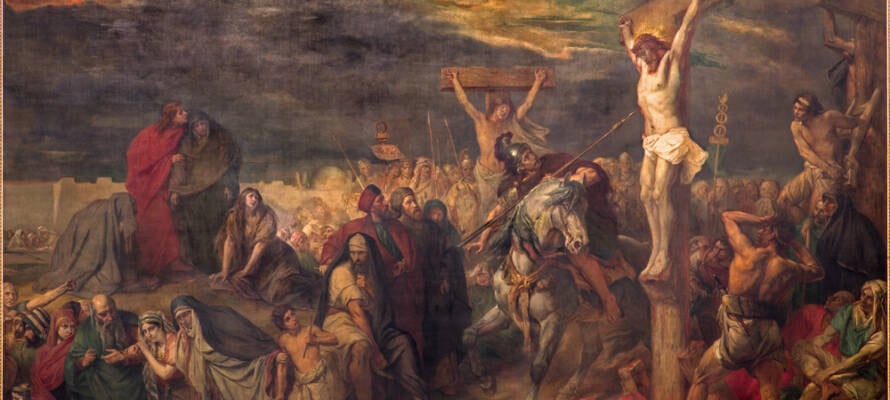Media stirs controversy by portraying Jesus as a modern Palestinian during the Israel-Hamas conflict, erasing his ancient Jewish identity in a politically charged narrative.
Chaim Lax, Honest Reporting
Every Christmas season, the mainstream media publishes several news articles and opinion pieces that seek to reinvent history by claiming that Jesus was Palestinian (or, at the very least, born in Palestine) and that the present-day experiences of Palestinians in the Holy Land are akin to the experiences of the Holy Family at the time of Jesus’ birth.
In effect, these pieces divorce the story of Jesus from its ancient Jewish context and re-settle it within a modern political milieu.
With the war between Israel and Hamas still raging through the Christmas season this year, the peddlers of the “Jesus was a Palestinian” narrative have gone into overdrive, inserting it into mainstream media coverage while also blasting it on social media.
No matter what some people may claim, #Jesus would never have identified as a "Palestinian."https://t.co/spXywxOJEu
— HonestReporting (@HonestReporting) December 30, 2020
In the mainstream media, the “Palestinian Jesus” story focused heavily on a nativity scene set up by the Evangelical Lutheran Christmas Church in Bethlehem, which depicts baby Jesus draped in a keffiyeh and laying atop a pile of rubble.
In numerous reports on this creative blend of traditional religious iconography and modern-day politics, the mainstream media has given the Church’s head, Reverend Dr. Munther Isaac, ample space to rejig the ancient figure of Jesus for a contemporary audience.
In The Guardian and the Washington Post, Reverend Isaac is quoted as saying that “If Jesus was born today, he’d be born under the rubble of Gaza,” essentially removing Jesus’ Jewish identity and making him a member of present-day Palestinian society.
In the Associated Press, Reverend Isaac is similarly quoted as saying that “We see Jesus in every child that’s killed [in Gaza].”
This sentiment was also expounded upon in an NPR program where one guest stated that “If you look for Jesus today, he is in Gaza.”
At Bethlehem’s Evangelical Lutheran Christmas Church, Rev. Dr. Munther Isaac set up a crèche with "Palestinian" baby Jesus wrapped in a keffiyeh and lying in a pile of rubble.
As a supporter of the Kairos Palestine, @MuntherIsaac is an antisemite who espouses replacement… pic.twitter.com/sah26sAAhm
— Elder of Ziyon
(@elderofziyon) December 21, 2023
Instead of implicitly connecting Jesus to contemporary Palestinian society, the Irish Examiner went so far as to claim that “Jesus was a Jewish Palestinian refugee,” while a guest on CNN’s Christmas Day programming referred to Jesus as a “Palestinian Jew.”
You don’t need a degree in ancient history to understand why referring to Jesus as “Palestinian Jew” is a misnomer.
Considering the word "Palestina" wasn't invented by the Romans until about 2CE — 200 years after Jesus was born — we can say with confidence that he was not a Jewish "Palestinian" as @GarethOCal claims in @irishexaminer.https://t.co/NxG0smHFwQ pic.twitter.com/kT5dr2lPCo
— HonestReporting (@HonestReporting) December 11, 2023
Along with Jesus’ newly found Palestinian identity, some media outlets also drew comparisons between Israel’s treatment of the Palestinians and the treatment of the Holy Family by Herod and the Romans.
On NPR, one guest drew a parallel between the Roman occupation of Judea and Israel’s current control over the West Bank. He blatantly disregarded the fact that Bethlehem falls under the authority of the Palestinian Authority and that the Romans were foreign occupiers while Israel is an indigenous state.
Similarly, both NPR and the Religion News Service ran absurd comparisons between the descent of Jesus’ family to Egypt in order to escape Herod’s bloodlust and Israel’s ordering Palestinians in northern Gaza to move south for their own safety as the IDF works to rout Hamas from the north.
If mainstream media organizations are willing to serve as platforms for the re-invention of Jesus, it is no surprise that anti-Israel news organizations also did so.
In a report on the muted Christmas festivities in the Holy Land this year, Al Jazeera referred to Jesus as being born in Palestine with no mention of his Jewish ancestry.
For its part, Iran-sponsored Press TV did reference Jesus’ Jewish background, even calling him a “Jewish rabbi,” but then dove headfirst into a discussion of whether, as a Palestinian, present-day Jesus would only be a member of Hamas’ civil administration or whether he would have joined the military (i.e. terrorist) wings of Hamas and Islamic Jihad.
‘Jesus of Palestine’
In this Christmas edition of the show, we will be asking where Jesus would stand as the Palestinian resistance factions continue to push back against Israel’s barbaric occupation forces.https://t.co/uEWGdBp0jmhttps://t.co/uEWGdBp0jm
— Press TV
(@PressTV) December 23, 2023
On social media, the “Jesus was Palestinian” narrative also spread like wildfire, with many being much more blatant in their erasure of Jesus’ Jewish identity.
On Instagram, US Representative Alexandria Ocasio-Cortez posted a story which claimed that Jesus “was born in modern-day Palestine,” compared Israel to the Romans, and absurdly asserted that “this high Christian holiday is about honoring the precious sanctity of a family that, if the story were to unfold today, would be Jewish Palestinians.”
That would certainly be something to note as there are currently no “Jewish Palestinians.”
On X (formerly Twitter), independent journalist Richard Medhurst posted a rant with the headline “Remember this Christmas that Jesus is Palestinian,” while UN-accredited activist Mohamad Safa tweeted that Christmas is the celebration of “the birthday of a Palestinian man.”
Former Dutch parliamentarian Arnoud van Doorn even went to the extreme of posting an antisemitic illustration of Jesus on the cross, wrapped in Palestinian symbols and surrounded by soldiers, with the caption “They killed him again. Merry Christmas.”
They killed him again.
Merry christmas.#Gaza pic.twitter.com/CpR9oJpGwg
— Arnoud van Doorn (@ArnoudvDoorn) December 24, 2023
It is not uncommon for people to read their personal experiences into Biblical stories and texts, drawing inspiration and comfort in times of need.
However, the replacement of Jesus’ Jewish background with a modern-day Palestinian identity goes beyond textual interpretation, serving as a means of discrediting both the Jewish state as well as erasing the indigenous connection between contemporary Jews and the Holy Land.
Keep Israeli Soldiers Warm - Send Winter Jackets!
We are honored to thank the young men and women of the IDF who risk their lives every day to defend the citizens of Israel.
Join us in sending winter care packages and personal notes of support to Israeli soldiers who are out in the cold all day.
Warm up a soldier's heart with essential winter wear including fleece jackets, hats, gloves and more. Keep an entire unit warm!
THE SOLDIERS REALLY APPRECIATE YOUR LOVE AND CONCERN!























